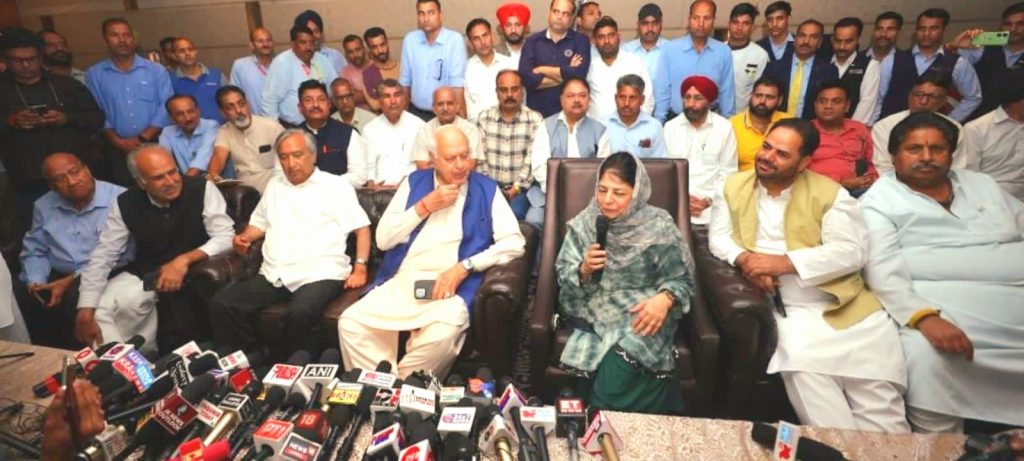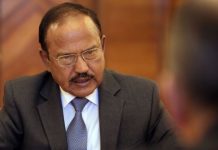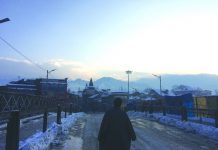
Prominent leaders from all opposition parties of Jammu and Kashmir barring the BJP, met in Jammu on October 3 to seek restoration of political and constitutional rights in the state and demand immediate holding of Assembly elections in the Union Territory. A report by Riyaz Wani
When opposition parties of Jammu and Kashmir met in Jammu on October 3 – a second such meeting after their meeting in June – it was no ordinary occasion. This is for the first time that the ideologically divergent political parties from the two regions are collaborating to press for the restoration of political and constitutional rights in J&K, with their principal demand being the holding of Assembly elections in the union territory.
But while the Assembly elections appear elusive, the banding together of almost all major J&K parties sans the BJP is a development of far greater significance. The meeting was attended by prominent leaders from various parties, underlining the unity of the opposition in addressing the pressing issues faced by the people of Jammu and Kashmir. Notable attendees included PDP president Mehbooba Mufti, her party’s general secretary Amreek Singh Reen, J&K Congress president Vikar Rasool Wani, and working president Raman Bhalla. The gathering also welcomed CPI(M) leader M.Y. Tarigami, Dogra Sadar Sabha chief Gulchain Singh Charak, and Jammu and Kashmir Shiv Sena (UBT) president Manish Sahni.
Later, while addressing a press conference, former J&K chief minister Dr Farooq Abdullah expressed deep concern over the atmosphere created by the BJP-led government across India. He lamented that “the constitution is suspended, and the democratic rights of the people of Jammu and Kashmir are under attack.” He asked why elections were not being conducted despite the delimitation process and the finalization of the voter list, pointing out the inconsistency in government claims that “everything is fine” in the region while elections remained on hold.
Emulating Ladakh
The strengthening unity among J&K political parties minus the BJP mirrors the solidarity between the political groups from Leh and Kargil in the union territory of Ladakh. The common fear of losing land and jobs to outsiders has brought together Leh and Kargil, which otherwise have traditionally worked at cross-purposes.
However, the bridging of differences between parties from Kashmir and Jammu could not have been easier. While major Kashmiri parties such as the National Conference and the PDP have aggressively opposed the revocation of Article 370, which granted special status to J&K under constitution, the parties based in Jammu have by and large supported the far-reaching move. In coming together, therefore, the parties are mainly focussing on the broad points of agreement: the early organizing of Assembly polls and restoration of statehood, their implicit common minimum programme, as it were.
As for the People’s Alliance for Gupkar Declaration (PAGD), it has not only gone out of the public discourse but its constituent parties such as the National Conference, the PDP and others have ceased every activity that might indicate the grouping’s existence.
When the PAGD was formed in October last year, its constituent parties pledged “perseverance and steadfastness” towards the restoration of Article 370. This resolution was written in the alliance’s declaration where the political parties stated there would be “nothing about us without us,” meaning they will stick together come what may. But within three months of its formation, the People’s Conference led by Sajad Gani Lone quit the alliance. Ever since the PAGD has progressively restricted its activities to a point where now fewer people remember that it once existed.
“We have forged a political common ground with counterparts in Jammu to press for our political rights,” said a politician who didn’t want to be identified. “We are one on the demand for early Assembly elections and restoration of statehood.”
Will this pan-J&K opposition unity force the central government to hold Assembly polls in near future? There are no such signs so far. But a united opposition could certainly hit the chances of the BJP winning in the union territory in the next year’s general elections.












